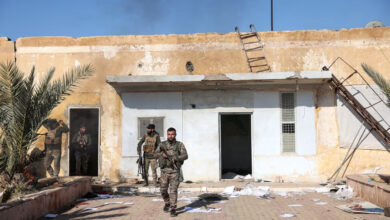Damascus — On the streets of Deraa on Thursday, protestors continued to march in the tens of thousands despite a security crackdown that has left at least 44 dead, according to the latest reports, marking one of the bloodiest weeks in Syria in decades.
Despite presidential aide Bouthaina Shaaban’s public denial Syrian President Bashar al-Assad ordered the carnage, analysts say the fatalities show the regime remains willing to use brutal violence to stamp out political dissent.
“Syria’s security services have shown a criminal disregard for the lives of their fellow citizens,” said Syria Human Rights Watch researcher Nadim Houry.
The crackdown is not surprising considering the regime’s history of quelling unrest. In 1982 the regime of erstwhile President Hafez al-Assad enforced a siege on the town of Hama that claimed tens of thousands of lives in an attempt to curb a revolt led by members of the Muslim Brotherhood. State security has also used violence in recent days to suppress protests in other Syrian cities.
The security response to a potential escalation in protests in Deraa and elsewhere is leaving observers troubled and uncertain.
The bloodshed has shocked Syrians and shaken the regime. Officials at Deraa’s main hospital told reporters they received 37 bodies, riddled with bullet wounds, after the bloodiest day of violence on Wednesday.
Youtube videos have also circulated, purportedly showing the bloodied bodies of victims lying on Deraa’s streets. The footage is being played on Arabic news channels readily available in Syria.
A doctor attempting to treat those wounded in the clashes and an 11-year-old boy who died after inhaling tear gas used by security forces are believed to be among the dead.
The anger among protestors on Thursday was clear. "Traitors do not kill their own people," they chanted. “The blood of martyrs is not spilled in vain!"
In the wake of the massacre, the Assad regime blamed “outside agitators” for the unrest. The raid on Deraa’s Omari mosque early Wednesday morning, state media said, was the responsibility of an “armed gang” that was pursued and brought to justice by state security forces.
But many accuse the Syrian army, including a unit headed by the president’s brother Maher al-Assad, of executing the attack.
The army on Friday continues to maintain a heavy presence on Deraa’s streets, with reporters sighting an increasing number of troops entering the city.
The regime, however, has also tried to appear conciliatory. Along with Shaaban’s denial of Assad’s involvement in the carnage, she, speaking on state television, discussed the possibility of lifting emergency laws that have helped the ruling Baath party retain power since 1963.
She also announced presidential decrees raising wages for public sector employees, while adding the regime intends to look into legalizing new political parties.
Little of this is new. Permitting new political parties has been hashed over for years, with no action taken. Raising wages is just the latest in a string of piecemeal concessions made by the regime since the revolutions and uprisings in the Arab World began to rattle its nerves in January.
The ostensible compromises, however, are unlikely to appease protestors in Deraa, activists say.
“That ship has sailed,” said Mohja Kahf, a Syrian rights activist now living in the US.
Like many in Syria’s activist community living abroad, Kahf is appalled at the violence wreaked on protestors but believes it will only serve to galvanize the opposition.
Ammar Abdulhamid, another Syrian activist based in Washington who maintains contact with Deraa’s demonstrators, says the protestors on the ground want political reforms that Assad’s regime are simply unwilling to give.
“This is not about give us bread, or punish this or that official, or end this or that practice,” said Abdulhamid. “This is about the whole package now…freedom.”
“Naturally, these demands are unacceptable to Bashar, meaning crackdowns and protests will continue, and in time, they will spread to other parts in Syria.”
Some argue the combination of cold-blooded killing and reform overtures suggests the regime is in disarray. Ayman Abdul Nour, a prominent dissident who edits the All4Syria news site from Dubai, says the government is divided among those who want direct action to quash the protests and those who want to listen to demands.
“Its very clear now there is a struggling inside the regime,” said Abdul Nour.
The president has yet to visibly align with either camp. Prominent figures in Damascus with links to the regime have expressed concern that Assad is being isolated from events.
But others say the reaction of the government is typical, and the use of violence to ramp up the pressure is just one tactic used to curb protest escalation.
“The Syrian government tends to muddle through both external and internal threats to stability,” said David Lesch, a professor of Middle East history at Trinity University in the US.
But in the long term, Leach says, Assad needs to “get ahead of the curve” and start implementing genuine political reforms in an effort to prevent further unrest and serious threats to his authority.
And the Syrian people, Leach added in contrast to some sentiments of activists, may still be willing to give the government the opportunity to enact reform.
“The Syrian population in general has a history of giving up freedoms in favor of stability. They are very wary of instability, especially when it’s on their borders,” he said, referring to the violence in neighboring Lebanon and Iraq.
Fear of instability, along with the genuine anger and disgust at the carnage that unfolded in Deraa, appears evident on the streets of Damascus.
“Safety and security is really important,” said one Syrian arts student who requested anonymity. “People are worried that the unrest will mean a disaster without meaning.”




